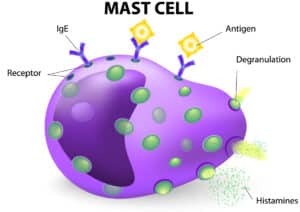Introduction to Mast Cell Disorders Mast Cell Disorders (MCDs) represents a complex spectrum of conditions, each characterized by the malfunctioning of mast cells, either through inappropriate activation or abnormal proliferation within the body. This spectrum encompasses both clonal and non-clonal forms, including Mast Cell Activation Syndrome (MCAS).
Role of Mast Cells in the Immune System: Mast cells are a vital type of white blood cell central to our immune defense. They act as sentinels, guarding against foreign invaders such as viruses, pathogens, allergens, and bacteria. Upon encountering these external threats, mast cells respond by releasing a variety of chemical mediators. These mediators, including the well-known histamine, play a pivotal role in communicating with and mobilizing other parts of the body’s defense system. Histamine’s influence is particularly extensive, affecting nearly every organ system.
What are mast cell disorders (MCDs)? Mast cell disorders (MCDs) are various health issues caused by mast cells not working right. These cells, which are important in our immune system, can either become too active or grow too much in the body. This includes a condition known as Mast Cell Activation Syndrome (MCAS), where these cells behave abnormally.
Mast Cells: Your Body’s Guards: Think of mast cells as tiny security guards in your body. They’re a type of white blood cell that helps protect you from viruses, germs, and allergens. When these cells spot a threat, they send signals (including histamine) to alert the rest of your immune system. Histamine can affect almost every part of your body so that allergic reactions can have many different symptoms.
Histamine Intolerance and MCAS: When we talk about histamine intole
rance, it’s like a part of what happens in MCAS but not the whole story. People with histamine intolerance react to histamine, but the problem is bigger in MCAS. The mast cells in people with MCAS release not just histamine but a whole bunch of other signals, too. This means MCAS can cause a wider range of issues and is more complex than being sensitive to histamine.

Understanding Histamine Intolerance, MCAS,and Food Sensitivities
Histamine Intolerance Histamine intolerance happens when your body can’t break down histamine properly. Histamine is a chemical naturally found in your body and certain foods, like aged cheeses, fermented products, and some types of fish. People with histamine intolerance might experience symptoms like headaches, skin irritation, or digestive issues after eating histamine-rich foods. This is because their bodies accumulate more histamine than they can handle, leading to these reactions.
Mast Cell Activation Syndrome (MCAS) MCAS is a condition where the mast cells in your body – which are part of your immune system – become overly active. These cells release various chemicals, not just histamine, but others too, in response to what they incorrectly perceive as threats. This overreaction can cause many symptoms, including skin rashes, digestive problems, and even difficulty breathing. MCAS is more complex than histamine intolerance because it involves a broader immune response and can be triggered by various factors, not just the consumption of histamine-rich foods.
Food Sensitivities: are different from both histamine intolerance and MCAS. They occur when your body has a non-allergic reaction to certain foods. This might be due to various reasons like enzyme deficiencies (like lactose intolerance), reactions to food additives, or other components in food. The symptoms of food sensitivities are usually limited to digestive issues, such as bloating, gas, or stomach pain, and they typically occur after eating the offending food.

Key Differences The main difference between these conditions lies in their cause and the range of symptoms. Histamine intolerance is specifically related to the body’s inability to handle histamine, leading to symptoms when consuming certain foods. MCAS involves a more generalized and severe immune system overreaction, causing a wider array of symptoms that can be triggered by more than just food. On the other hand, food sensitivities are direct reactions to specific food components and are usually confined to digestive discomfort.
It’s important to understand these differences for proper diagnosis and treatment. If you suspect you have any of these conditions, it’s best to consult with a healthcare professional for an accurate diagnosis and appropriate management plan.
